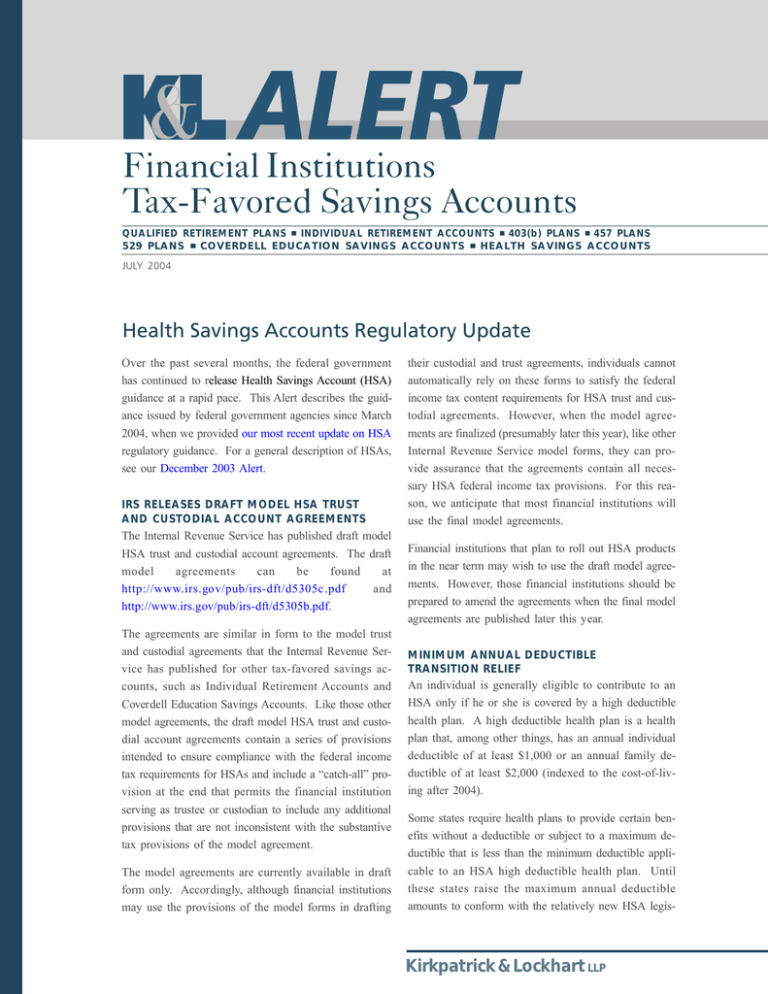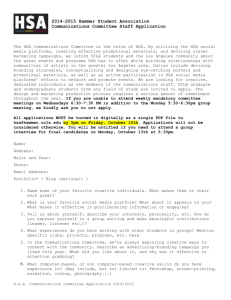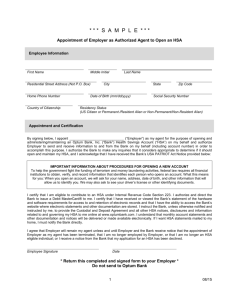
Financial Institutions
Tax-Favored Savings Accounts
QUALIFIED RETIREMENT PLANS ■ INDIVIDUAL RETIREMENT ACCOUNTS ■ 403(b) PLANS ■ 457 PLANS
529 PLANS ■ COVERDELL EDUCATION SAVINGS ACCOUNTS ■ HEALTH SAVINGS ACCOUNTS
JULY 2004
Health Savings Accounts Regulatory Update
Over the past several months, the federal government
has continued to release Health Savings Account (HSA)
guidance at a rapid pace. This Alert describes the guidance issued by federal government agencies since March
2004, when we provided our most recent update on HSA
regulatory guidance. For a general description of HSAs,
see our December 2003 Alert.
IRS RELEASES DRAFT MODEL HSA TRUST
AND CUSTODIAL ACCOUNT AGREEMENTS
The Internal Revenue Service has published draft model
HSA trust and custodial account agreements. The draft
model
agreements
can
be
found
at
http://www.irs.gov/pub/irs-dft/d5305c .pdf
and
http://www.irs.gov/pub/irs-dft/d5305b.pdf.
The agreements are similar in form to the model trust
and custodial agreements that the Internal Revenue Service has published for other tax-favored savings accounts, such as Individual Retirement Accounts and
Coverdell Education Savings Accounts. Like those other
model agreements, the draft model HSA trust and custodial account agreements contain a series of provisions
intended to ensure compliance with the federal income
tax requirements for HSAs and include a “catch-all” provision at the end that permits the financial institution
serving as trustee or custodian to include any additional
provisions that are not inconsistent with the substantive
tax provisions of the model agreement.
The model agreements are currently available in draft
form only. Accordingly, although financial institutions
may use the provisions of the model forms in drafting
their custodial and trust agreements, individuals cannot
automatically rely on these forms to satisfy the federal
income tax content requirements for HSA trust and custodial agreements. However, when the model agreements are finalized (presumably later this year), like other
Internal Revenue Service model forms, they can provide assurance that the agreements contain all necessary HSA federal income tax provisions. For this reason, we anticipate that most financial institutions will
use the final model agreements.
Financial institutions that plan to roll out HSA products
in the near term may wish to use the draft model agreements. However, those financial institutions should be
prepared to amend the agreements when the final model
agreements are published later this year.
MINIMUM ANNUAL DEDUCTIBLE
TRANSITION RELIEF
An individual is generally eligible to contribute to an
HSA only if he or she is covered by a high deductible
health plan. A high deductible health plan is a health
plan that, among other things, has an annual individual
deductible of at least $1,000 or an annual family deductible of at least $2,000 (indexed to the cost-of-living after 2004).
Some states require health plans to provide certain benefits without a deductible or subject to a maximum deductible that is less than the minimum deductible applicable to an HSA high deductible health plan. Until
these states raise the maximum annual deductible
amounts to conform with the relatively new HSA legis-
Kirkpatrick & Lockhart LLP
lation, individuals in these states would, in the absence
of transition relief, be unable to obtain high deductible
health plan coverage and would not, therefore, be eligible to contribute to HSAs.
However, the Internal Revenue Service has provided these
individuals with transition relief from the minimum annual deductible requirement through December 31, 2005.
Under Notice 2004-43, a health care plan that would
otherwise be a high deductible health plan for HSA eligibility purposes but for compliance with a state-mandated maximum annual deductible will be deemed to be
a high deductible health plan through December 31, 2005.
This will temporarily enable individuals in states with
low maximum annual deductibles to contribute to HSAs.
The transition relief expires on December 31, 2005, but
this should give states sufficient opportunity to revise
their maximum annual deductible rules to conform to
HSA standards.
to contribute to an HSA if the FSA and/or HRA limit
covered reimbursements to expenses that constitute
“permitted coverage” or, in the case of HRAs, “permitted insurance.” (FSAs are not generally permitted
to reimburse insurance expenses.) The Internal Revenue Service also stated that the FSA and/or HRA can
permit reimbursement of preventive care expenses.
This is a somewhat surprising result: although an
HSA can cover preventive care expenses without regard to the HSA minimum annual deductible rules,
the HSA enabling statute does not appear to create an
exception to the “no other health coverage” rule for
preventive care. (Our March 2004 Alert, summarizes
the Internal Revenue Service’s prior guidance concerning the definition of preventive care.)
■
Suspended HRA. An individual who participates in
an HRA is eligible to contribute to an HSA if the
individual elects, before the beginning of the HRA
coverage period, not to be eligible to receive reimbursement of expenses that do not constitute permitted coverage, permitted insurance or preventive care.
■
Retirement HRA. An individual who participates in
an HRA is eligible to contribute to an HSA if the HRA
only permits reimbursement of expenses following
retirement and the individual has not yet retired (and,
thereby, become eligible to receive HRA reimbursements).
■
Post-Deductible FSA or HRA. An individual who
participates in an FSA and/or HRA is eligible to contribute to an HSA if the FSA and/or HRA only permits
reimbursement of medical expenses after the minimum annual HSA deductible has been satisfied. Like
the preventive care conclusion discussed above, this
conclusion is somewhat surprising inasmuch as the
HSA enabling statute does not appear to create an
exception to the “no other health coverage” rule for
expenses incurred after the minimum annual HSA
deductible has been satisfied.
COORDINATION OF FSA, HRA AND
HSA REIMBURSEMENTS
An individual is eligible to contribute to an HSA only if,
among other things, the individual has no health coverage other than health coverage under a high deductible
health plan. Exceptions to this rule include (i) “permitted insurance” (health coverage under which substantially all of the coverage provided relates to liabilities
incurred under workers’ compensation laws, tort liabilities, liabilities relating to ownership or use of property,
insurance for a specified disease or illness, and insurance
that pays a fixed amount per designated period of hospitalization), and (ii) “permitted coverage” (coverage for
accidents, disability, dental care, vision care or longterm care).
Because flexible spending accounts (FSAs) and employer-sponsored health reimbursement arrangements
(HRAs) are considered “health coverage,” an individual’s
participation in FSA or HRA arrangements could jeopardize an individual’s eligibility to contribute to an HSA.
However, in Revenue Ruling 2004-45, the Internal Revenue Service highlighted a number of FSA and HRA
design structures that would not run afoul of the HSA
“no other health coverage” rule. The approved arrangements described in Revenue Ruling 2004-45 are:
■
2
Limited Purpose HSAs and FSAs: An individual
who participates in an FSA and/or an HRA is eligible
Notably, the Revenue Ruling only addresses HSA eligibility rules. FSA rules permit reimbursement of expenses
only where expenses are not otherwise eligible for reimbursement from some other source. Accordingly, employers that are attempting to coordinate FSA, HSA and HRA
reimbursements will need to be careful to ensure that FSAs
only permit reimbursement before or after all other sources,
including HRAs and HSAs, have been used.
KIRKPATRICK & LOCKHART LLP FINANCIAL INSTITUTIONS TAX-FAVORED ACCOUNTS ALERT
DEPARTMENT OF LABOR CONFIRMS THAT AN
EMPLOYER’S CONTRIBUTION TO EMPLOYEE
HSAs DOES NOT CREATE AN ERISA PLAN
In Field Assistance Bulletin 2004-1, the Department of
Labor has confirmed that employer contributions to employees’ HSAs generally do not create a plan subject to
the Employee Retirement Income Security Act of 1974
(ERISA), regardless of whether the high deductible plans
in which the employees participate are sponsored by the
employer or obtained by the employees as individual
coverage.
arrangement to ERISA. (See Department of Labor Regulation Section 2520.3-1(j).) The reason for the difference
in the two conclusions appears to lie in the notion that in
selecting a group insurer, an employer is, effectively, establishing a specific plan that provides employees with
materially different rights than would be available from
other insurers, whereas, the selection of an HSA provider
does not generally affect the substantive HSA benefits to
which the employees are entitled.
MICHAEL A. HART
mhart@kl.com
This conclusion is conditioned upon the following
factors:
■
■
■
■
■
■
The establishment of employees’ HSAs is completely
voluntary on the part of the employees.
The employer does not limit the ability of eligible individuals to move their funds to another HSA beyond
restrictions imposed by the Internal Revenue Code.
The employer does not impose conditions on utilization of HSA funds beyond those permitted under the
Internal Revenue Code.
The employer does not make or influence the investment decisions with respect to funds contributed to
an HSA.
The employer does not represent that the HSAs are an
employee welfare benefit plan established or maintained by the employer.
The employer does not receive any payment or compensation in connection with an HSA.
The Department of Labor also notes that “the mere fact
that an employer imposes terms and conditions on contributions that would be required to satisfy tax requirements
under the [Internal Revenue Code] or limits the forwarding of contributions through its payroll system to a single
HSA provider (or permits only a limited number of HSA
providers to advertise or market their HSA products in the
workplace) would not affect the above conclusions regarding HSAs funded with employer or employee contributions, unless the employer or the HSA provider restricts
the ability of the employee to move funds to another HSA
beyond those restrictions by the Code.” This is a departure from the Department of Labor’s approach to employer
involvement in group or group-type insurance arrangements, in which employer contributions could subject the
412.355.6211
Our Financial Institution Tax-Favored Savings Accounts
practice is part of our Employee Benefit Plans/ERISA
practice. If you would like more information about our
Employee Benefit Plans/ERISA practice, please contact
one of the attorneys listed below:
Boston
Stephen E. Moore
617.951.9191
smoore@kl.com
Los Angeles
William P. Wade
310.552.5071
wwade@kl.com
New York
David E. Morse
212.536.3998
dmorse@kl.com
Pittsburgh
William T. Cullen
Michael A. Hart
J. Richard Lauver
Charles R. Smith
Richard E. Wood
Linda B. Beckman
Sonia A. Chung
Douglas J. Ellis
412.355.8600
412.355.6211
412.355.6454
412.355.6536
412.355.8676
412.355.6528
412.355.6716
412.355.8375
wcullen@kl.com
mhart@kl.com
rlauver@kl.com
csmith@kl.com
rwood@kl.com
lbeckman@kl.com
schung@kl.com
dellis@kl.com
San Francisco
Laurence A. Goldberg
Katherine L. Aizawa
Marc R. Baluda
Lynn H. DuBois
415.249.1043
415.249.1044
415.249.1036
415.249.1039
lgoldberg@kl.com
kaizawa@kl.com
mbaluda@kl.com
ldubois@kl.com
Washington
Catherine S. Bardsley
William A. Schmidt
David E. Pickle
Lori G. Galletto
202.778.9289
202.778.9373
202.778.9887
202.778.9024
cbardsley@kl.com
william.schmidt@kl.com
dpickle@kl.com
lgalletto@kl.com
®
Kirkpatrick & Lockhart LLP
Challenge us. ®
www.kl.com
BOSTON
■
DALLAS
■
HARRISBURG
■
LOS ANGELES
■
MIAMI
■
NEWARK
■
NEW YORK
■
PITTSBURGH
■
SAN FRANCISCO
■
WASHINGTON
...............................................................................................................................................................
This publication/newsletter is for informational purposes and does not contain or convey legal advice. The information herein
should not be used or relied upon in regard to any particular facts or circumstances without first consulting a lawyer.
© 2004 KIRKPATRICK & LOCKHART LLP.
ALL RIGHTS RESERVED.




